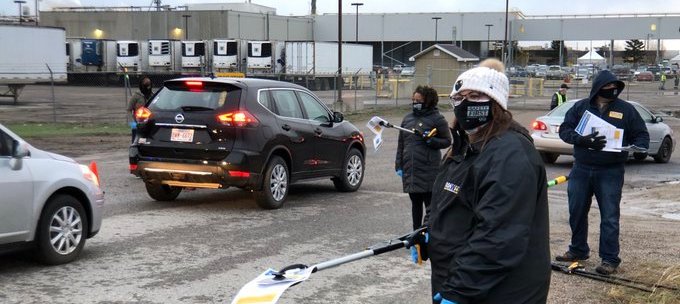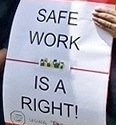 | ||
Ariana Quesada, the 16 year old daughter of Benito Quesada, filed a formal complaint with the RCMP on January 8 asking police to investigate potential criminal negligence in the death of her father. Benito Quesada, a 51-year-old worker at the Cargill meat processing plant in High River Alberta. The father of four and shop steward died of COVID-19 on May 7, 2020, one of almost 1,000 workers who contracted COVID-19 at the plant. He was the second worker to die at Cargill from COVID-19. Hiep Bui, 67, died on April 19, 2020. Armando Sallegue, the father of Cargill worker Arwyn Sallegue, also died of COVID-19 after Arwyn contracted COVID-19 at work. "We have filed a complaint ... to finally bring justice to my dad ... to finally hold Cargill accountable for what they did," Ariana Quesada said. Ariana has the support and assistance of Local 401 of the United Food and Commercial Workers (UFCW) which represents workers at the Cargill plant. The complaint filed by Ariana Quesada cites the Westray Law, a Criminal Code provision named after a deadly mining disaster in Nova Scotia in 1992 that provides for criminal prosecution for employers who fail to take "reasonable steps to prevent bodily harm" to workers. The complaint states that Cargill failed to heed early public health warnings and failed to protect workers from a known, deadly threat. The RCMP has confirmed that it has opened a file. Media reports state that this is the first known file opened regarding a workplace-related COVID-19 death. Michael Hughes, spokesperson for local 401 of the United Food and Commercial Workers (UFCW) which represents workers at the Cargill plant, pointed out that the threat of fines for violations of occupational health and safety laws is not a strong deterrent for a company like Cargill which reported revenue of $113.5 billion U.S. in 2019. "I think what the situation at Cargill really exposed is that there are severe limits to accountability" under current workplace rules," he said. The plant is also facing a class action lawsuit initiated by people who had close contact with workers at Cargill. While workers who are covered by Workers Compensation are prohibited from suing their employer for wrongful death or injury, families and close contacts are not. Class action lawsuits must receive judicial certification before they can proceed. Cargill workers and their families and
friends are to be saluted for their courage and determination to hold Cargill to account
and for justice for all who have died or lost their loved ones because
of the refusal of those in authority to hold Cargill to account. (With files from CBC and the Calgary Herald) For Your information The Ongoing Fight of Cargill Workers to Protect Themselves and Their CommunityWorkers at the Cargill meatpacking plant in High River, Alberta, and their union, United Food and Commercial Workers Union Local 401, took action in March of 2020 to protect the workers and demand that the company take action when they became aware of 38 cases at the plant. On March 20 the union presented a plan to reconfigure the workplace, to extend the work week to allow for social distancing, and for rigorous safety measures to be put in place. The company did not comply. On April 12, 250 workers signed a letter to the Mayor of High River calling on him to support their call to close the plant for two weeks. The union President issued a public call on April 13 for a two-week shutdown of the plant. By that time 30 members of the union across North America had died
In the written complaint and request for an RCMP investigation initiated by Ariana Quesada, the daughter of Cargill worker Benito Quesada, and supported by the union, what are considered acts of negligence by the company include; failure to provide adequate PPE, forcing workers to work elbow to elbow, with no social distancing; crowded lunch/break rooms and locker space with no ability to socially distance; company medical personnel clearing workers for duty despite positive COVID-19 tests or symptoms; and offering $500 bonus pay to workers who did not miss a shift in a two-month period. It is only the constant vigilance of the workers which has prevented a re-occurrence of the devastating outbreak in April and May. (Photo: UFCW Local 401) The Westray Bill |



 Cargill
ignored all the calls of the workers and Local 401 until finally
closing the plant on April 20, by which time over 440 workers had been
infected and one had died. Government agencies also failed to act to
protect the workers. Alberta Occupational Health and Safety had
conducted only virtual "inspections" and had not entered the plant,
nevertheless declaring it safe, arrogantly ignoring the evidence of the
workers. During a virtual town hall meeting on April 18, Alberta
Agriculture Minister Devin Dreeshen told the workers that it was safe
to go to work, and that Cargill had taken all necessary measures to
keep staff safe. He also accused those advocating a temporary plant
closure
of "misinformation and fear-mongering." Two days later the plant was closed for a two
week shutdown.
Cargill
ignored all the calls of the workers and Local 401 until finally
closing the plant on April 20, by which time over 440 workers had been
infected and one had died. Government agencies also failed to act to
protect the workers. Alberta Occupational Health and Safety had
conducted only virtual "inspections" and had not entered the plant,
nevertheless declaring it safe, arrogantly ignoring the evidence of the
workers. During a virtual town hall meeting on April 18, Alberta
Agriculture Minister Devin Dreeshen told the workers that it was safe
to go to work, and that Cargill had taken all necessary measures to
keep staff safe. He also accused those advocating a temporary plant
closure
of "misinformation and fear-mongering." Two days later the plant was closed for a two
week shutdown.
